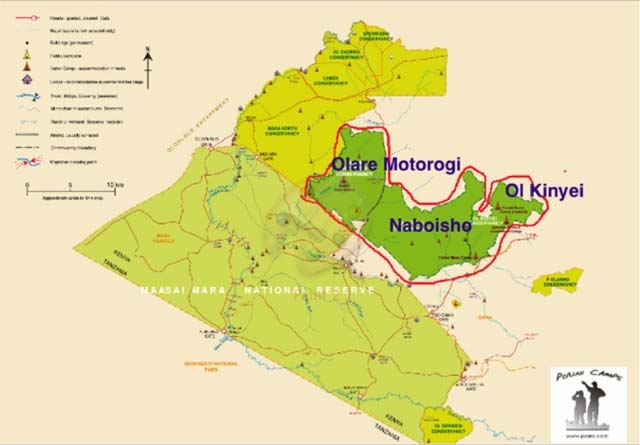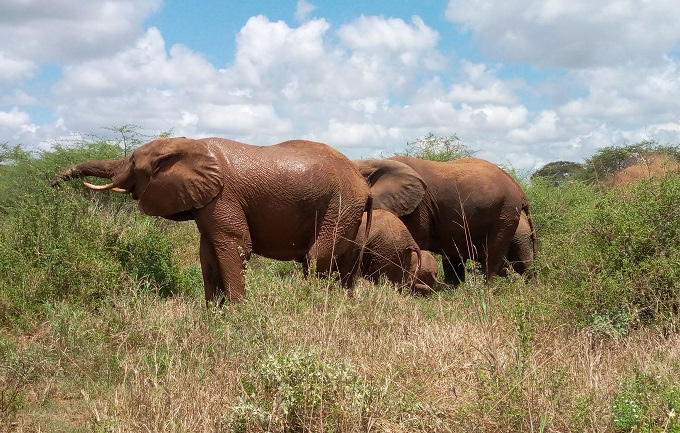Adopt an Acre
Prevent the collapse of community conservancies
in times of crisis
Securing space for wildlife
Encountering habitat loss through the community conservancy model
Wild animals are declining catastrophically and for many species the numbers have halved in a relatively short period. This is almost entirely due to habitat loss from massive increases in the human population, especially in Africa. Many of the forests and wilderness areas where animals once lived in abundance have now been lost to destructive logging, intensive farming, and human settlement. Animals are being displaced, losing their former rangelands, and falling victim to wanton killing, retaliatory attacks, or poaching.
In Kenya, the human population has increased from 10 million to 50 million in five decades. Space formerly available for wildlife is disappearing rapidly as the land becomes densely settled and sub-divided with fences which are excluding wildlife and changing migration patterns.
There needs to be more space for nature. In Kenya, less than 8% of the land surface area is in the state-controlled National Parks & National Reserves. This is just not enough to provide a home for all the wild animals that reside outside the parks but are losing their habitat.
Our community wildlife conservancies
Vast areas of protected wilderness on land owned by Maasai communities
As you may know, Gamewatchers Safaris has been instrumental in adding 100,000 acres of protected wildlife habitat adjacent to the Mara Reserve in the form of three adjoining wildlife conservancies: Ol Kinyei, Naboisho, and Olare Motorogi on land leased from thousands of individual families of the Maasai community.
The conservancies which we have been involved in establishing with a few other like-minded safari tourism companies in partnership with the local people in the Mara eco-system since 2005 cover 100,000 acres of land made up of plots leased from Maasai families who have set aside their parcels of land in that area to become protected wildlife habitat and who use the remaining million acres of community land to the north and east for settlement and ranching. Thus the conservancies are dedicated to the protection of wildlife and to the creation of income and livelihoods for the community landowners by supporting conservation.
In addition to the Mara, we had previously set up the Selenkay Conservancy, on 13,500 acres of community land in the Amboseli eco-system which has been a great success in conserving the wildlife dispersal area and eco-system beyond Amboseli National Park, especially for elephants and big cats.
These Conservancies have been recognized as playing a vital role in expanding the lands where wildlife can freely roam beyond the boundaries of the National Parks and National Reserves, allowing the big cats and elephants to have a safe haven where they can thrive. And they have made a big difference in the lives of many hundreds of people from the local Maasai communities who own the land where the Conservancies are located. They derive a monthly income from the rents paid to them for their plots of land that have been leased and put together to form the Conservancies and many of their family members have jobs and livelihoods within the conservancies where they work as wardens, rangers, and as staff in the safari camps looking after visitors and taking them out to enjoy watching all the different wildlife species.
Kenya’s eminent elephant conservationist, Cynthia Moss, has described the setting up of the Conservancies as “the single most successful conservation initiative since the creation of National Parks in the 1940s”. Cynthia states: “Conservancies protect land for Kenya’s wildlife and even more important, create sanctuaries of safety. In addition conservancies bring benefits in the form of direct payments and jobs to the people who share their land with wildlife.”


Here, Porini Amboseli Camp safari guide, Daniel Mamai, explains the many benefits that the low-key tourism generated by Gamewatchers Safaris & Porini Camps brings to his community and to the wildlife in Selenkay Conservancy.
This video shows a large herd of elephants with calves in Ol Kinyei Conservancy (April 2020). Elephants are increasingly attracted into the pristine habitat of the conservancy where they are safe and protected.
Lions – and other big cats – are also attracted into the conservancies where there is plenty of food and natural habitat
Elephants are also thriving in Selenkay Conservancy
Small-Scale Responsible Tourism
The Impact of the COVID-19 Pandemic

It is the income from tourism by visitors staying at our small Porini Camps that enables us to pay for all the costs of running the conservancies and to create incomes for the local community from the rents for their land and for paid employment for their family members. The sums provided to the local community in direct payments to them from Gamewatchers Safaris is projected to be nearly US$1.5 million in 2020.
If we cannot use tourism to generate the funds needed to keep paying the land leases and to provide the wages for all the staff in the coming months then the local Maasai communities will suffer and the future of the conservancies will be threatened. If the local communities can no longer depend on the conservancies to provide the income which they have been receiving without fail for many years, there is a very real risk that the conservancies will have to be turned into farmland and fenced off or developed for human settlement, as is happening on the neighbouring lands outside the conservancies, which will mean a huge loss of wildlife habitat and the end of much of the wildlife in those areas especially the big cats and the elephants.
Read MoreSecuring the impact of crisis on wildlife conservation
The Adopt an Acre Plan
As Gamewatchers Safaris, out of the 100,000 acres in the Mara plus 13,500 acres in Amboseli, on our own as a single company we are directly paying for the leasing of over 42,500 acres at a cost to us of over US$863,783 a year in rents to hundreds of Maasai families and we directly employ 247 members of staff in the conservancies and camps drawn from the local Maasai community at a total cost to us of over $621,200 in wages. This is a total income of nearly US$1.5 million for the community in rents and wages generated from the 42,500 acres, paid for by Gamewatchers Safaris, excluding the additional costs which we also incur in managing the conservancies as well as funding a number of community projects.
It is the income from our safari tourism that pays for the land leases and the wages for all the community members working in the camps and conservancies but with the present disruption to global tourism because of the Pandemic, we need an alternative to tourism as a way of covering these costs so that our conservancy and camp staff from the Maasai community can continue to earn an income. If we are unable to continue paying the rents because income from tourism has totally stopped, then the conservancies will be in danger of collapse as the local community will need to use their land to earn an income from other activities and the staff in the conservancies will lose their jobs.
Recently many of our customers have asked how they might help to provide some financial contributions so that the local people can continue receiving an income during these difficult times and we have now come up with our “Adopt-an-Acre” plan as a way of funding the payments to the community at a time when there is no tourism income.
Through the “Adopt-an-Acre” plan, contributors can adopt an acre of land in the conservancy for a year with a donation to the Wildlife Habitat Trust which has been set up as a fund to help to pay the staff wages until the camps re-open, as well as the land leases so that the Maasai families continue receiving the rents and the conservancies can continue to exist. The Trust is audited by a reputable firm of auditors in Nairobi, Grant Thornton Kenya, so that contributors can be confident that all the money is going direct to the Maasai community.
With the 42,500 acres leased by Gamewatchers Safaris providing an income of almost US$1.5 million to the community, this means that in a year, every acre of conservancy land supported by us is creating a protected habitat for wildlife and also generates US$35 going straight to the local people with US$20 going to payments for land rents and US$15 to wages.
- To adopt 1 acre for a year requires a donation of US$35 of which US$15 goes to conservancy and camp staff wages and US$20 goes to the families.
- To adopt 5 acres with a donation of US$175 means US$75 going towards the wages of the 247 Maasai staff and US$100 going towards rent payments to hundreds of families.
- To adopt 30 acres the donation is US$1050, with US$450 going to wages and US$600 going to the families
As a special incentive, anyone adopting 30 acres or more will receive a credit from Gamewatchers Safaris for the same amount donated, to be used for payment of a stay at any of the Porini Camps in 2023 or 2024. So a donation of US$ 1050 to adopt 30 acres will receive a travel credit worth US$ 1050.
GIFT IT!
The adoption of acres to help support wildlife makes a wonderful gift to a friend or relative! And for larger donations (over US$ 1050) the travel credit can be applied to a booking for yourself or for someone that you nominate. So if you know someone that would love a true wilderness experience in some of Africa’s best wildlife locations then simply donate below, email us at info@gamewatchers.com and let us know what name to add to the Adoption Certificate.
HOW TO TAKE PART:
We are collecting donations on behalf of the Wildlife Habitat Trust via Donorbox. Please use the form below (payments are accepted by debit card, credit card or PayPal).
Payments are received in US$ but your own account does not need to be a US$ account and can be in a different currency (for example GB£, Canadian or Australian dollars, Euros or other currencies). Your bank will debit your account in your local currency for the equivalent of the amount sent in US dollars using their international exchange rate.
100% of the donations that we collect will be passed to the Wildlife Habitat Trust for use towards land leases and salaries of staff from the conservancy’s local communities.

